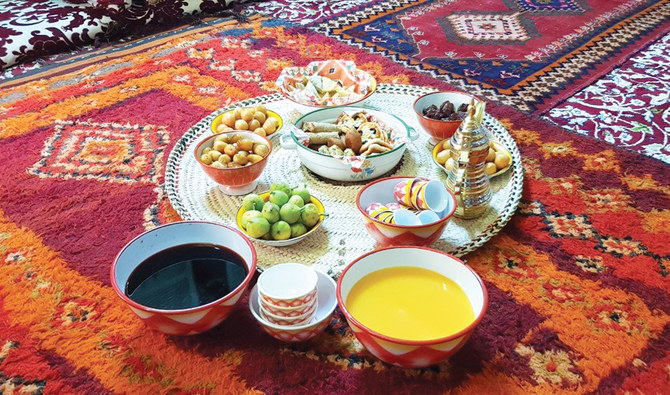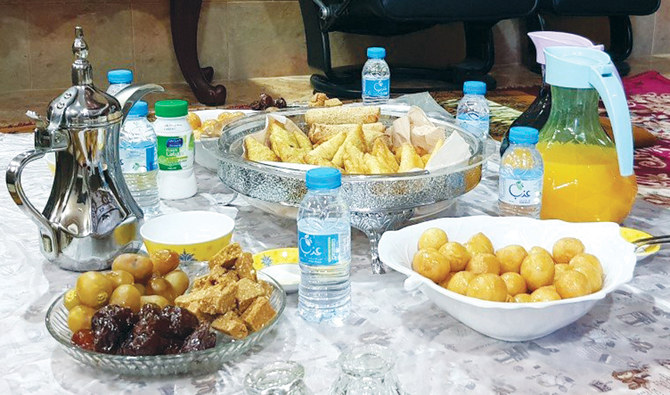JEDDAH: Around the world, Muslims’ eating habits and sleeping patterns change during Ramadan with the obligation to abstain from eating and drinking during daylight hours.
However, this sudden shift in routine needs to be handled carefully since our bodies are not used to this lifestyle.
Apart from spiritual advantages, fasting offers several health benefits. However, depending on one’s health, every individual should adapt to this routine in their own way.
Several weeks before the holy month, people began circulating health tips on social media, including hints on weight loss, detoxification, ways to fight fatigue and dealing with bad breath.
Experts frequently warn people against blindly following online tips because of the health risks. In many cases, these suggestions lack scientific proof, and are accompanied by exaggerated claims and testimonials.
Arab News caught up with some health experts to discuss common misconceptions during Ramadan and asked them to provide helpful tips for healthy fasting.
Chance to lose weight
People often view Ramadan as a chance to lose weight because their food intake is lower than usual.
Dr. Mohannad Badghaish, a senior registrar in internal medicine, agrees that fasting can help shed extra weight and offers several guidelines.
“Eat three balanced meals a day, including breakfast, dinner and sahoor. Each meal should consist of 30 percent protein, 15-20 percent fat and 50 percent carbohydrates, while also maintaining daily workout,” he said.
Clinical and sports dietician Sundos Malaikah advises against aiming for rapid weight loss, suggesting a gradual behavioral change that can be maintained during and after Ramadan.
“Weight that is quickly lost will most probably be quickly regained. It is scientifically proven that such diets often fail. I always try to promote improving your relationship with food first, learning about hunger and satiety cues, while gradually changing eating behavior,” she told Arab News.
People often adopt an “all-or-nothing” approach to changing habits, while taking things step by step is more sustainable and healthier, Malaikah said.
She suggests people avoid eating processed foods and rely on natural sources.
According to Malaikah, weight loss is simple if a person eats natural food and makes sure their food intake matches their energy needs.
Associating weight loss with less food is inaccurate, she said.
If our body had toxins in it, we would be lying in a hospital. Our body is equipped with strong mechanisms that detoxify and remove any harmful substances. No green juice will do that for you.
Sundos Malaikah Sports dietician
In a time where many people are worried about their health due to the coronavirus threat, fasting can help improve health when done properly.
Overeating
However, an abundance of food and sweets not only prevents people from gaining the health benefits but also goes against the spiritual value of Ramadan.
“Our immune system is quite complex and very powerful. There are no individual foods that will make it stronger. Unfortunately, that is a misconception. We can boost its fighting abilities by providing the right environment, which is staying physically active, getting enough high-quality sleep, managing stress and eating well,” she said.
Badghaish also warned that excessive consumption of food has a negative impact on health and goes against Islamic teaching.
“The Prophet Muhammad said: ‘A human being fills no worse vessel than his stomach. It is sufficient for a human being to eat a few mouthfuls to keep his spine straight. But if he must (fill it), then one-third of food, one-third for drink and one-third for air,’” he said.
Physical activities
Exercise is another important factor in weight loss, but there are conflicting opinions on the best time to work out during Ramadan and if it is wise to exercise while fasting.
Badghaish said that there is no harm in exercising while fasting, but for non-diabetics “the best time to exercise is 60 to 90 minutes before breakfast/iftar.”
Malaikah said that the benefits of exercising on an empty stomach are often exaggerated.
“The claim we often hear is that our body is using our fat store for fuel. While that may be true, it doesn’t mean fat loss. My body is using my fat stores for energy all the time simply because that’s how it works. Using fat doesn’t equate with losing fat,” she said.
Therefore, the best time for a workout is whenever you can, and to lose weight you should watch your food intake.
Detox
Malaikah also offered a warning on detoxification diets or meals.
“If our body had toxins in it, we would be lying in a hospital. Our body is equipped with strong mechanisms that detoxify and remove any harmful substances. No green juice will do that for you. Unfortunately, a lot of marketing tries to sell ideas that don’t have much scientific evidence,” she said.
“If you want to make your body work at its best, do at least 150 minutes of cardio exercise during a week along with resistance exercises twice a week, and eat well and mindfully. Our bodies usually tell us when to stop eating and when to start. If we listened instead of continuing to eat while ignoring all these cues, our health would be better.”
Common complaints
Many people usually experience headaches, fatigue, difficulties concentrating or doing our daily work while fasting, especially during the first days of Ramadan. Badghaish said that the main reason for these symptoms is insufficient compensation for the lost water and fluids from the body. A man should drink about
3 liters of water per day, while a woman should drink 2.5 liters, he said. Liquids that contain sugar are not recommended. Caffeine also speeds up water loss, so its consumption should be reduced or avoided during Ramadan.
HIGHLIGHTS
• People should avoid eating processed foods and rely on natural sources.
• The best time for a workout is whenever you can.
• A man should drink about 3 liters of water per day, while a woman should drink 2.5 liters.
Bad breath may result from fasting due to lack of water and food for long hours, making one feel embarrassed and uncomfortable. However, it is possible to control the problem.
Malaikah said that certain types of food, such as spices, garlic and onions, can affect breath.
“Maintaining proper oral hygiene helps — brushing our teeth at least twice per day, using a mouthwash and flossing on a daily basis. Additionally, eating at least five servings of fruits and vegetables per day often helps as well,” she said.
Breath odor can be a sign of dental or gastrointestinal problems that might need expert help. “Among the causes of bad breath with the digestive tract are
esophageal reflux, high blood sugar and liver failure,” Badghaish said.
While fasting is obligatory for all healthy adult Muslims, there are exemptions for those who are ill or whose health could be affected by fasting, for example, pregnant or breastfeeding women and people with certain health conditions.


















